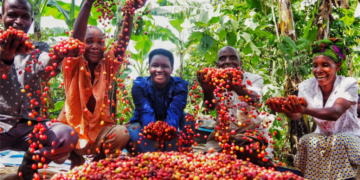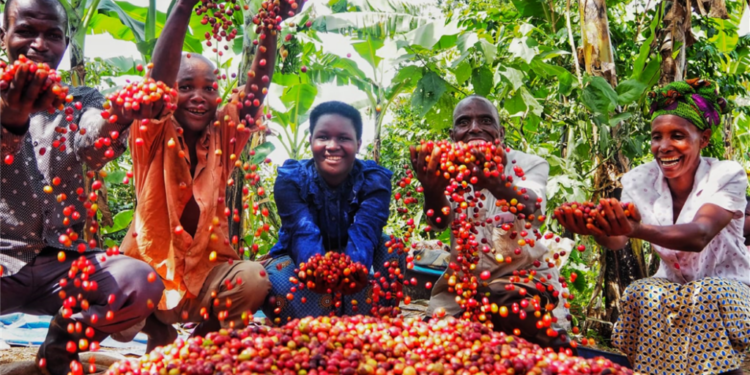Kampala, Uganda – January 1, 2025 — President Yoweri Kaguta Museveni has congratulated Ugandans for their outstanding success in coffee production, attributing it to favourable prices driven by global challenges in coffee-producing nations like Brazil and Vietnam.
In a public address marking the start of 2025, Museveni emphasised how Uganda’s thriving coffee industry directly results from the National Resistance Movement’s (NRM) strategic agricultural policies introduced in the 1996 manifesto.
Central to this success, according to the President, is the implementation of the “4 Acres Model” which promotes intensive agricultural practices designed to maximise the yield of smallholder farmers.
The model advocates for one acre of clonal coffee, one acre of fruit crops (such as mangoes, oranges, and pineapples), one acre of pasture for dairy cattle, one acre of food crops (including bananas and cassava), and the integration of backyard poultry and piggery, as well as fish farming at the edge of wetlands.
Museveni explained that these policies were informed by thorough research into both local and global market demand, ensuring that Ugandans could earn good incomes even from small plots of land.
He noted that while other crops like tea, sugarcane, and tobacco may require larger-scale farming to be profitable, the “4 Acres Model” ensures that families with limited land can still succeed economically.
“The success of coffee is not just a fluke. Our scientists, who were liberated from the constraints of past regimes, played a pivotal role in developing the seeds and improving production practices,” the President remarked.
He also highlighted the role of Operation Wealth Creation (OWC) in distributing coffee seedlings, which he credits for increasing Uganda’s coffee production from 2.7 million bags in 2013 to 9 million bags today.
The President did not limit his praise to coffee alone. He proudly outlined Uganda’s broader agricultural progress, including increases in food crop and livestock production, which have contributed to low inflation and economic stability.
In addition to these achievements, Museveni pointed out that while the country had made significant strides, 2024 was marred by natural disasters like landslides in Bulambuli and floods in Kasese.
The President urged Ugandans to avoid building in vulnerable areas such as wetlands or steep slopes to mitigate the risks posed by these disasters.
In his message, Museveni also warned the public about the growing threat of monkeypox, advising that those infected with the disease report to health centres immediately and avoid spreading it through physical contact or unprotected sex.
Finally, Museveni congratulated Uganda’s sportsmen and women for their outstanding performance in international competitions like the Olympics, Commonwealth Games, and African Games.
He noted that the country’s focus on peace-building and economic recovery has begun to yield results in talent-based sectors, and highlighted Uganda’s forthcoming opportunity to host the CHAN tournament and AFCON 2027 in collaboration with Kenya and Tanzania.
“I thank everybody and wish all of you a prosperous 2025,” concluded Museveni, reaffirming the government’s commitment to ensuring a brighter future for Uganda.








